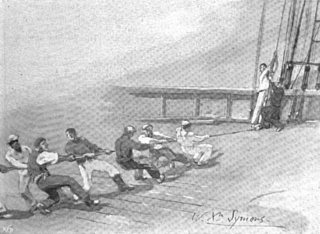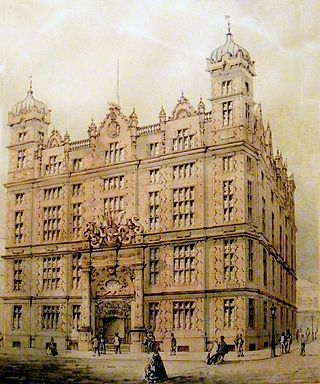Related Research Articles

A sea shanty, chantey, or chanty is a genre of traditional folk song that was once commonly sung as a work song to accompany rhythmical labor aboard large merchant sailing vessels. The term shanty most accurately refers to a specific style of work song belonging to this historical repertoire. However, in recent, popular usage, the scope of its definition is sometimes expanded to admit a wider range of repertoire and characteristics, or to refer to a "maritime work song" in general.

"The Sash" is a ballad from the Province of Ulster in the north of Ireland commemorating the victory of King William III in the Williamite War in Ireland in 1690–1691. The lyrics mention the 1689 Siege of Derry, the 1689 Battle of Newtownbutler near Enniskillen, the 1691 Battle of Aughrim, and the 1690 Battle of the Boyne. It is popular amongst Ulster loyalists and many other unionists in Northern Ireland, it also remains a popular folk ballad in parts of Ireland and Scotland.

Play is the third studio album by Canadian band Great Big Sea, released in 1997. Between 1996 and 2016, Play was the ninth best-selling album by a Canadian band in Canada.
"I'se The B'y" is a traditional Newfoundland folk song/ballad. "I's the B'y" is in the Newfoundland English dialect, and translates to standard English as "I'm the Boy" or "I'm the Guy". The Canadian Songwriters Hall of Fame decided to honour the song in 2005, officially accepting it as part of the Canadian Song Hall of Fame.
"The Ryans and The Pittmans" is a popular Newfoundland folk song. It tells of the romantic entanglements of a sailor named Bob Pittman, and his desire to sail home to finally marry his "sweet Biddy". The song is also known as "We'll Rant and We'll Roar", after the first line of the chorus; however, this is also the name by which some foreign variants are known.
"The Banks Of Newfoundland" is the earliest Newfoundland composition set down in music notation. It was composed by Chief Justice Francis Forbes in 1820 and published in a piano arrangement by Oliver Ditson of Boston. Originally composed as a dance, it was treated as a march by the soldiers of Royal Newfoundland Regiment during World War I; it later became the Regiment's authorized march.
"Oh Shenandoah" is a traditional folk song, sung in the Americas, of uncertain origin, dating to the early 19th century.
Old Polina is a traditional Newfoundland folk song. It is most likely based on the ship Polynia, built in 1861, of the Dundee Seal and Whale Fishing Company fleet. Polynia was commanded by Captain William Guy from 1883 to 1891, when she was sunk by ice in Davis Strait. This song is similar to another song called The Balaena, about another whaler.

"Maggie May" is a traditional Liverpool folk song about a prostitute who robbed a "homeward bounder": a sailor coming home from a round trip.
The Famous Flower of Serving-Men or The Lady turned Serving-Man is a traditional English language folk song and murder ballad. Child considered it as closely related to the ballad "The Lament of the Border Widow" or "The Border Widow's Lament".
"Unusually, it is possible to give a precise date and authorship to this ballad. It was written by the prolific balladeer, Laurence Price, and published in July 1656, under the title of The famous Flower of Serving-Men. Or, The Lady turn'd Serving-Man. It lasted in the mouths of ordinary people for three hundred years: what a tribute to the work of any writer, leave alone the obscure Laurence Price. Oral tradition, however, has made changes. The original has twenty-eight verses and a fairy-tale ending: “And then for fear of further strife, / he took Sweet William to be his Wife: / The like before was never seen, / A Serving-man to be a Queen”. - Roy Palmer, A Book of British Ballads

"Lady Franklin's Lament" is a traditional folk ballad indexed by George Malcolm Laws and Steve Roud. The song recounts the story of a sailor who dreams about Lady Franklin speaking of the loss of her husband, Sir John Franklin, who disappeared in Baffin Bay during his 1845 expedition through the Arctic Ocean in search of the Northwest Passage sea route to the Pacific Ocean. The song first appeared as a Broadside ballad around 1850 and has since been recorded with the melody of the Irish traditional air "Cailín Óg a Stór" by numerous artists. It has been found in Ireland, in Scotland, and in some regions of Canada.
Makem and Spain was an Irish-American folk music band. The band was founded as "The Makem Brothers" in February 1989 by Rory, Shane, and Conor Makem, the three sons of "The Godfather of Irish Music" Tommy Makem, and grandsons of Irish source singer Sarah Makem.
Sarah Makem a native of Keady, County Armagh, Northern Ireland, was a traditional Irish singer. She was the wife of fiddler Peter Makem, mother of musicians Tommy Makem and Jack Makem, and grandmother of musicians Tom Sweeney, Jimmy Sweeney, Shane Makem, Conor Makem and Rory Makem. Sarah Makem and her cousin, Annie Jane Kelly, were members of the Singing Greenes of Keady.
Lamorna is a traditional folk song/ballad associated with Cornwall, and dealing with the courtship of a man and a woman, who turned out to be his wife. The title comes from Lamorna, a village in west Cornwall. Sheet music held in the British Library dates the song to 1910.
"A Brisk Young Sailor (Courted Me)" (variously known as "Bold Young Farmer", "The Alehouse", "Died For Love" and "I Wish My Baby Was Born" amongst other titles) is a traditional folk ballad (Roud # 60, Laws P25), which has been collected from all over Britain, Ireland and North America. The song originates in England in the early 1600s.
"The Lochmaben Harper" or "The Blind Harper" is a traditional British Folk ballad and is one of the ballads collected by Francis Child in The English and Scottish Popular Ballads (1882–1898).
Jack Tar is a common English term that was originally used to refer to seamen of the Merchant Navy or the Royal Navy, particularly during the British Empire. By World War I the term was used as a nickname for those in the US Navy. Members of the public and seafarers alike made use of the name in identifying those who went to sea. It was not used pejoratively, and sailors were happy to use the term to label themselves.
The Old Maid's Song is an American folk song. It recounts the story of a woman whose younger sisters have married, while she has remained a spinster into middle age. During the chorus of the song, the narrator defines a loose criterion for a husband.
Samuel James Larner was an English fisherman and traditional singer from Winterton-on-Sea, a fishing village in Norfolk, England. His life was the basis for Ewan MacColl's song The Shoals of Herring, and his songs continue to be recorded by revival singers.
References
- ↑ The line is included in 1992's Songs of the sea, rivers, lakes & canals, but not in 1994's American Ballads and Folk Songs, which reproduces a Welsh rendition from 1896. Silverman, Jerry (1992). Songs of the sea, rivers, lakes & canals. Mel Bay Publications. pp. 36–37. ISBN 1-56222-283-X.; Lomax, Alan; George Lyman Kittredge (1994). American Ballads and Folk Songs. Courier Dover Publications. p. 493. ISBN 0-486-28276-7.
- ↑ Ashton, John (1888). Modern street ballads. Chatto & Windus. pp. 251–252.
Jolly Roving Tar.